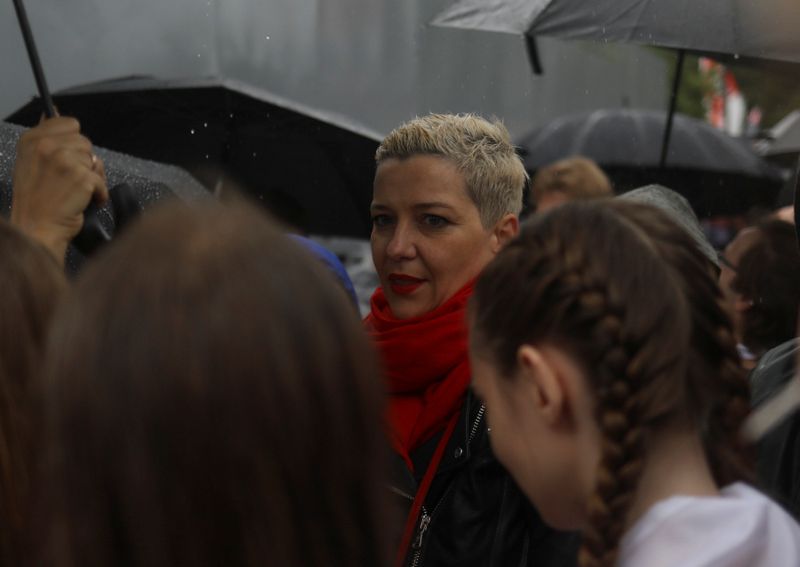By Andrew Osborn and Maria Vasilyeva
(Reuters) - Masked men detained Belarusian protest leader Maria Kolesnikova in central Minsk on Monday morning and drove her away in a van and two of her allies also disappeared later, the opposition movement said.
Kolesnikova, a member of the opposition coordination council, is the last of three female politicians left in Belarus who joined forces before an Aug. 9 presidential election to try to challenge veteran incumbent Alexander Lukashenko.
A vocal critic of Lukashenko, she has played an important role in weeks of mass demonstrations and strikes by protesters who accuse Lukashenko of rigging his re-election.
Lukashenko, who has been in power for the last 26 years, denies that allegation and has accused foreign powers of trying to topple him in a revolution. He has responded with a crackdown which some those detained say includes torture and beatings.
Three European Union diplomats told Reuters that the EU is now preparing to impose economic sanctions on 31 senior Belarus officials, including the interior minister, in response to the election and subsequent crackdown.
Facing his deepest crisis yet, Lukashenko retains the support of Russian President Vladimir Putin, who has promised to send in police to support him if needed.
Kolesnikova's abduction, if confirmed, comes as Belarusian authorities appear to be stepping up their efforts to try to halt the protests and obstruct the work of the opposition council, which they have accused of plotting to overthrow Lukashenko.
On Sunday, tens of thousands of people demonstrated across the country demanding Lukashenko step down. Security forces detained 633 protesters, Belarusian authorities said.
MASKED MEN
Police in Minsk were cited by Russia's Interfax news agency as saying they had not detained Kolesnikova.
A witness, Anastasia, was cited by the Tut.By media outlet as saying she had seen Kolesnikova pushed into a dark-coloured van by masked men in plain clothes in central Minsk.
She said Kolesnikova's mobile phone had dropped to the ground during the tussle and that one of the masked men detaining her had picked it up before the van sped off.
The opposition council said two other activists, Anton Rodnenkov and Ivan Kravtsov, disappeared soon afterwards and said the authorities appeared to be systematically targeting its members.
"It's obvious that these methods are illegal and cannot lead to anything else apart from an escalation in the situation in the country, deepening the crisis and fuelling protests," it said in a statement.
"We see that the authorities have openly begun to use terror tactics in recent days," it added, calling the actions crimes against humanity.
Lithuanian Foreign Minister Linas Linkevicius likened what had happened to Kolesnikova to something that the Stalin-era secret police in the Soviet Union would have done.
"Instead of talking to the people of Belarus, the outgoing leadership is trying cynically (to) eliminate (them) one by one," he wrote on Twitter.
"The kidnapping...is a disgrace. Stalinist NKVD methods are being applied in 21st century Europe. She must be released immediately".
Before the election, Kolesnikova had joined forces with opposition presidential candidate Sviatlana Tsikhanouskaya who later fled to Lithuania, and with Veronika Tsepkalo, who has since left for Poland.
Another leading activist, Olga Kovalkova, arrived in Poland on Saturday, saying she had been told she would face arrest if she stayed in Belarus.

The crisis is hitting the Belarus economy. Central bank figures published on Monday showed the former Soviet republic had burned through nearly a sixth of its gold and foreign exchange reserves, or $1.4 billion, in August, as it fought to prop up its rouble currency during the wave of unrest.